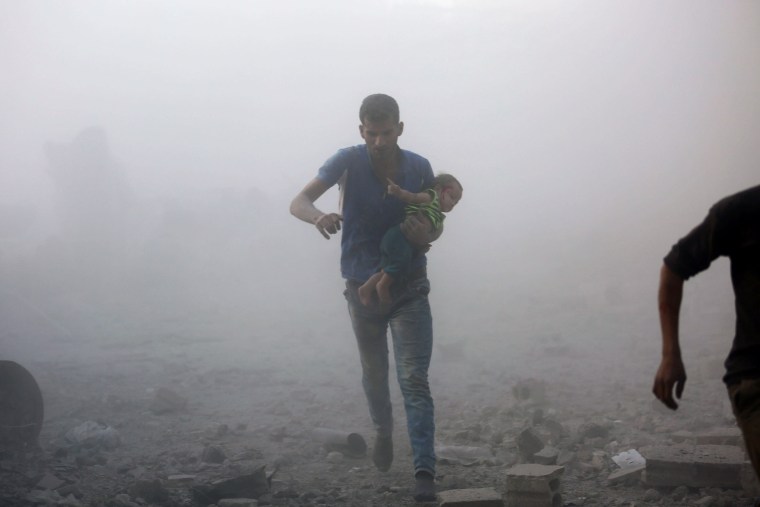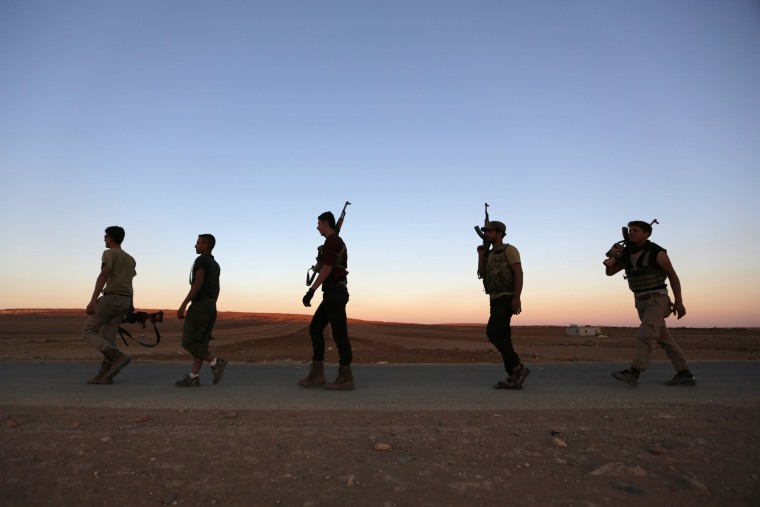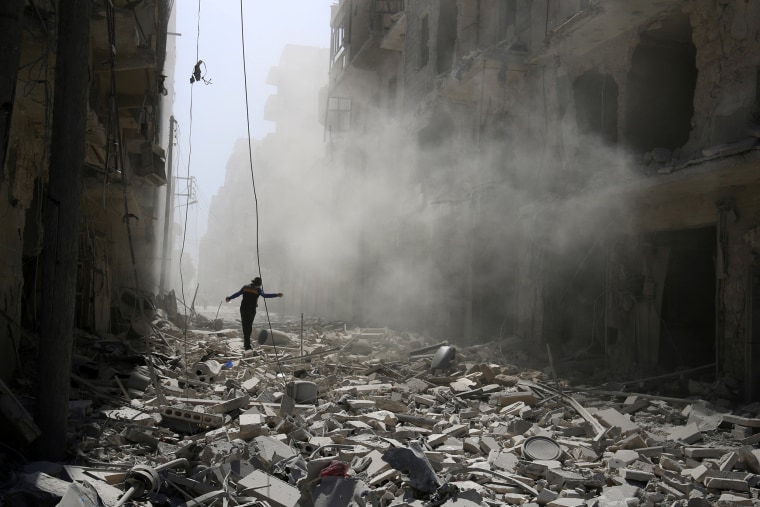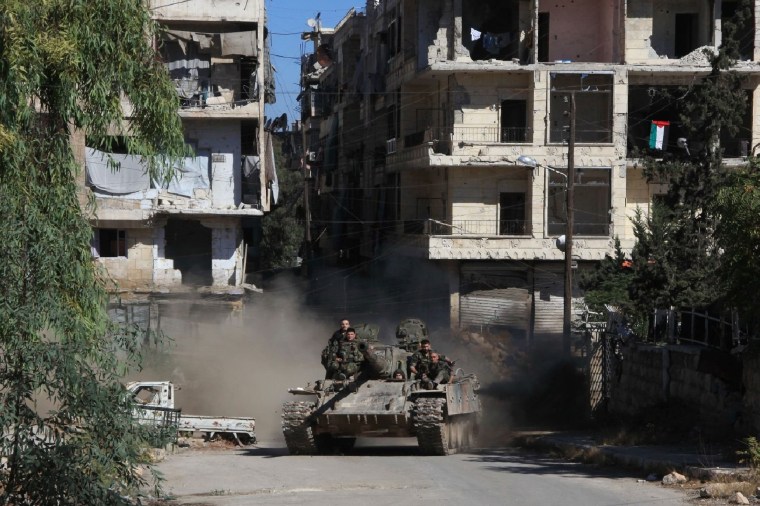Nearly six years of civil war capped with one of the most devastating weeks in Syria after the dissolution of a short-lived ceasefire and the possible fall of Aleppo has left the U.S. and global leaders at a crossroads of how to address the seemingly never-ending conflict.
And what seems to be the only certainty in the crisis is that few good options are available, national security experts said.
“The options are to pull the plug on this phony diplomatic process, continue to make the defeat of the Islamic State a priority, or consider putting new cards on the table, and that would be some sort of military action,” said Aaron David Miller, vice president of the Woodrow Wilson International Center for Scholars.
Related: U.S. Officials: Thousands of Ground Troops Massing Around Aleppo
It is a particularly vexing problem for an administration that has been reluctant to intervene in Syria beyond working to defeat ISIS, foreign policy experts said. The U.S. has deployed special forces, training for Kurdish rebels and financial aid to fight the Islamic State.

tal
Since the president ignored his infamous “red line” four years ago, he has indicated no intention of involving significant U.S. treasure, resources or blood in the civil war or engaging in a proxy war with Russia or Iran, which has left few options, foreign policy experts said. Last month, during a meeting an audio recording noted as held at the Dutch Mission to the U.N., Secretary of State John Kerry bemoaned to a group of Syrian civilians that U.S. diplomatic efforts to stop the bloodshed in Syria haven't been backed by threats to use military force, the New York Times reported Friday.
There is little will within Congress or the American people to support sending U.S. troops to end the conflict, Kerry reportedly said.
"I've argued for use of force. I stood up, I'm the guy who stood up and announced we're going to attack Assad because of the weapons, and then you know things evolved into a different process," Kerry said in the audio. "But the bottom line is that Congress refused to even vote to allow that."
Related: Kerry Audio Shows Frustration With Inability to Stop Syria Bloodshed

Meanwhile, last week was a particularly deadly week in Syria with more than 1,000 civilians, including 300 children, killed or injured in the past few days from bombings in rebel-held eastern Aleppo from Russian-backed President Bashar al-Asaad’s forces.
Hospitals continue to be targeted. Three of the last remaining hospitals have been severely crippled from bombings, including a pediatric hospital and the complete destruction of the area's main trauma center.
"The health care system in eastern Aleppo is all but obliterated," U.N. relief coordinator Stephen O'Brien said in a report.
And on Friday, two senior U.S. officials told NBC News that they worry that the war-torn city could soon fall.
The barrage of more than 1700 military strikes is the result of a failed ceasefire agreement negotiated between Russia and the U.S. that has left the U.S. on the verge of cutting off diplomatic discussions with the Russians over Syria.
Related: At a Hospital in Aleppo, Evidence of a Detested Weapon
U.S. officials have expressed dismay, frustration and outrage as Russia is reportedly sending more aircraft to the region. Kerry, in the audio recording obtained by the New York Times, expressed frustration at the diplomatic process, and said: "The problem is the Russians don't care about international law, and we do."
This “is the most savage week we’ve seen,” U.S. Ambassador to the United Nations, Samantha Power, said during a meeting at the United Nations Thursday, adding that it is “soul-shattering” and “a race to the bottom.”

Aide groups are pleading for assistance. UNICEF’s Deputy Executive Director Justin Forsyth said children of Aleppo are “trapped in a living nightmare” and a UN relief coordinator, Stephen O’Brien, told the United Nations Security Council that “east Aleppo this minute is not at the edge of the precipice, it is well into its terrible descent into the pitiless and merciless abyss of a humanitarian catastrophe unlike any we have witnessed in Syria.”
Related: Russia Warns of 'Terrible' Consequences if U.S. Attacks Syrian Government Forces
Powers acknowledged that the latest has led to “a turning point” in this war.
What turn the U.S. will make, however, is unclear.
Deputy National Security Adviser Tony Blinken told Congress last week that the administration is weighing options.

“As I indicated the president has asked all of the agencies to put forward options, some familiar, some new, that we are very actively reviewing,” Blinken said. “When we are able to work through these in the days ahead, we’ll have an opportunity to come back and talk about those in detail but we are in the process of doing that.”
Tennessee Republican Sen. Bob Corker, chairman of the Senate Foreign Relations Committee, was skeptical.
“So let me say what we already know, there is not plan B,” Corker said.
Corker and proponents of a more aggressive U.S. involvement in Syria are full of skepticism because they have been waiting for a “Plan B” for several months. Kerry promised earlier this year that he would have a back-up plan if his talks with Russia fail.
Related: Kerry Audio Shows Frustration With Inability to Stop Syria Bloodshed
As the ceasefire negotiated with Russia fell apart much more quickly than the months it took to negotiate it, White House spokesperson Josh Earnest said the president has pressed officials to come up with alternative plans.
“The president is going to continue to push his team to look for and evaluate additional options that we can undertake to try to reduce the violence, increase the flow of humanitarian assistance, and kick-start the kind of political transition talks that everybody acknowledges are necessary to address the root cause of the situation in Syria,” Earnest told reporters Thursday.
In the audio recording during a meeting at the U.N., Kerry suggested the idea of a Syrian election overseen by the United Nations in which refugees anywhere in the world would be eligible to vote, the New York Times reported. The Obama administration has long called for Assad to step aside through a political transition.
Congress has a proposal to increase sanctions against Assad, but the administration opposed the proposal, worried that it would harm negotiations with Russia. And Congress is adjourned until after the elections.
Miller said that sanctions would have little impact anyway because the Assad regime is so heavily supported by Russia and Iran. He said the U.S. would also have to place further sanctions on Russia and re-up those on Iran. (The U.S. recently reduced sanctions against Iran over the nuclear deal.)
“We’re not prepared to do that,” Miller said.
Andrew Tabler a fellow at the Washington Institute for Near East Policy, said that the best option this late in the deadly war is to enforce any violation of the ceasefire.
“The (Assad) regime punishes the opposition but nobody punishes the regime,” he said.
Tabler, a proponent of more aggressive intervention, says Syria will be “the biggest black mark” on Obama’s presidency, saying there are plenty of options but the president is lacking any “will."
But Miller says that regardless of any “Plan B” the United States adopts, the situation is bleak.
“This is one of these problems that has no comprehensive solution,” Miller said. “It has a series of outcomes and the outcomes so far are only getting worse.”

